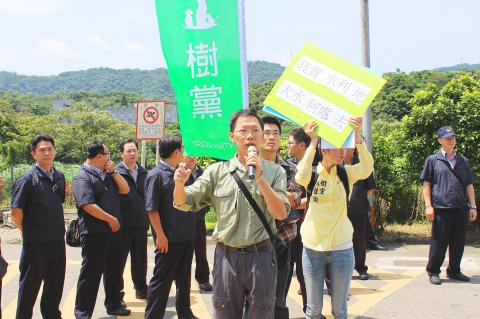Residents of Singuang Borough (新光) in Taipei’s Nangang District (南港) yesterday asked Taipei Mayor Ko Wen-je (柯文哲) to buy back what they said was an illegally acquired plot of land and a flood-relief channel beside the Sinjhuang Pond (新庄埤), to protect public safety in the flood-prone area.
Carrying banners and a petition, borough residents and members of the Trees Party yesterday morning congregated in a park overlooking the natural pond about 30 minutes before Ko’s motorcade was scheduled to pass by.
However, Ko’s chauffeur drove right past the crowd and the mayor began an inspection of the No. 202 Arsenal at the nearby Guanghua Military Complex without meeting the petitioners.

Photo: Sean Lin, Taipei Times
Upset with the situation, the demonstrators followed Ko’s motorcade to the gates of the military base, with party members and several residents saying that officials in Ko’s administration had received information before the event, but deliberately drove past, so the mayor would not have to address what petitioners described as a conflict of interests.
Sinjhuang Pond Protection Alliance spokesperson Cho Chi-ping (卓基坪) accused the administration of former Taipei mayor Hau Lung-bin (郝龍斌) of illegal profiteering on behalf of the Chi-Sing Irrigation Association and Hsin Lu Co, a construction company.
Hau’s administration abolished a lane on the plot after saying that a flood-relief channel that runs through it “was not serving its purpose well,” Cho said.
The move allowed the association, which had authority over the lane — which was connected to a plot Hsin Lu needed for construction — to sell it, Cho said.
The lane is now fenced off with a section of the canal, which together form part of Hsin Lu’s construction site for an apartment building.
A borough resident surnamed Liu (劉) said that Hau’s administration contravened a city bylaw related to lane abolition.
According to the bylaw, the city government should have indicated which lane it intended to abolish after performing an assessment, but Hau’s administration simply identified the land on which the lane is situated and seized it, Liu said.
He said the land seizure would exacerbate flooding during typhoons.
Now that Hsin Lu owns a stretch of the channel, dredging could be impeded as the city government no longer has authority over the facility, he said.
Liu said the borough suffered severe flooding when Typhoon Nari hit in 2001, with water up to a story high and the Kunyang MRT Station entirely submerged.
The channel is the only flood relief channel connected to Sinjhuang Pond and is pivotal to protecting residents’ safety, Cho said, adding that it should not have been compromised just because of supposed insufficient capacity.
The Nangang MRT station is connected to Taiwan Railways Adminstration lines, and is set to be linked to the Taiwan High Speed Rail, Cho said.
Losses would number in the billions of New Taiwan dollars if another major flood should occur, he said.
The demonstrators called on the city government to buy back the lane and designate the plot a wetland, which would prohibit future construction.
Taipei Deputy Mayor Teng Chia-chi (鄧家基) said the city government would examine all files relating to the case to probe any possible illegality, and that it would dutifully address residents’ appeals.

Alain Robert, known as the "French Spider-Man," praised Alex Honnold as exceptionally well-prepared after the US climber completed a free solo ascent of Taipei 101 yesterday. Robert said Honnold's ascent of the 508m-tall skyscraper in just more than one-and-a-half hours without using safety ropes or equipment was a remarkable achievement. "This is my life," he said in an interview conducted in French, adding that he liked the feeling of being "on the edge of danger." The 63-year-old Frenchman climbed Taipei 101 using ropes in December 2004, taking about four hours to reach the top. On a one-to-10 scale of difficulty, Robert said Taipei 101

Nipah virus infection is to be officially listed as a category 5 notifiable infectious disease in Taiwan in March, while clinical treatment guidelines are being formulated, the Centers for Disease Control (CDC) said yesterday. With Nipah infections being reported in other countries and considering its relatively high fatality rate, the centers on Jan. 16 announced that it would be listed as a notifiable infectious disease to bolster the nation’s systematic early warning system and increase public awareness, the CDC said. Bangladesh reported four fatal cases last year in separate districts, with three linked to raw date palm sap consumption, CDC Epidemic Intelligence

Taiwanese and US defense groups are collaborating to introduce deployable, semi-autonomous manufacturing systems for drones and components in a boost to the nation’s supply chain resilience. Taiwan’s G-Tech Optroelectronics Corp subsidiary GTOC and the US’ Aerkomm Inc on Friday announced an agreement with fellow US-based Firestorm Lab to adopt the latter’s xCell, a technology featuring 3D printers fitted in 6.1m container units. The systems enable aerial platforms and parts to be produced in high volumes from dispersed nodes capable of rapid redeployment, to minimize the risk of enemy strikes and to meet field requirements, they said. Firestorm chief technology officer Ian Muceus said

MORE FALL: An investigation into one of Xi’s key cronies, part of a broader ‘anti-corruption’ drive, indicates that he might have a deep distrust in the military, an expert said China’s latest military purge underscores systemic risks in its shift from collective leadership to sole rule under Chinese President Xi Jinping (習近平), and could disrupt its chain of command and military capabilities, a national security official said yesterday. If decisionmaking within the Chinese Communist Party has become “irrational” under one-man rule, the Taiwan Strait and the regional situation must be approached with extreme caution, given unforeseen risks, they added. The anonymous official made the remarks as China’s Central Military Commission Vice Chairman Zhang Youxia (張又俠) and Joint Staff Department Chief of Staff Liu Zhenli (劉振立) were reportedly being investigated for suspected “serious